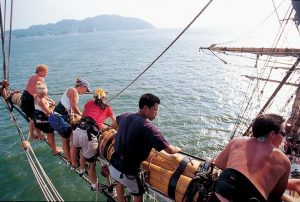Canada is My Home and not
Assignment 2:2
Write a short story (600 – 1000 words) that describes your sense of home; write about the values and the stories that you use to connect yourself to, and to identify your sense of home.
My initial sense of home comes from the land and above it the dwelling place to which one’s memories of home are attached. It started from Haifeng, my father’s hometown which is over four hours’ ride from Guangzhou my place of birth. He left Haifeng and removed to Guangzhou at around eight upon his parents’ early death. When I was little, my father would take me back to his birthplace for the annual “celebration” of Qingming festival, which is intended for commemorating our ancestors. I was always intrigued by how different he looked in his hometown than in Guangzhou where he could be identified as an immigrant for however long he has been around there. I guess the reason he was more than excited was he felt like he was home in the deepest sense. As the festive ceremonies went on, he would show me around his parents’ house and shared with me his own stories as well as the stories he was told of. His favourite story, which was told by one of the elders, is how my grandfather, a rice trader and a then head of the village, negotiated between several military forces with the rice as briberies and thus protected his homeland from being sacked and looted during WWII. My favourite story of his is, however, tied to his limited living experience with his parents in their house. There was one year my grandfather dressed my father up on his birthday like a Western body from a well-off family and took him some pictures at home. This was absolutely unusual as it happened in a farming community where things did not change much over centuries, given its remoteness from the political, economic and cultural centres such as Guangzhou. Then I found one of the answers to the question why my father and I would identify more with the Western cultural values than its Chinese counterparts in many cases. At that very point, I came to recognise it is not only my father’s home but mine as it helps us figure out where we come from and who we really are. The presence of the house is so important for sustaining all those fond memories as well as securing the sense of home that my father and his little brother keep an annual plan for the maintenance of the house which is now actually left vacant and remains functional only for celebrations of some festivals. The idiom “a man’s home is his castle” makes perfect sense here.
However, one may argue that the sense of home is not complete if the man is not living with his family in the castle. I did not realise that I had actually been homeless in Canada until when my father was recently diagnosed with lung cancer at the late-stage. I went back to Guangzhou to look after him and saw him through some tough medical treatments in the past summer. When considering the final arrangements, he asked me how to deal with the flat, which is literally my birthplace, when he and my mother are both gone. I replied, “I have no idea. What I am certain about though is the place will become meaningless to me when you are not around.” When the time came that I had to get going back to my Canada home, I broke down. I cried, really hard, when I saw my father waving good-bye to me from across the street in front of the hospital in his wheelchair with my mother standing behind him shedding tears. Then I knew I was leaving home rather than coming (home in Canada). In the sense that home is anywhere my family is, Canada is not my home as my parents live over 6,000 miles apart.
Having said that, the multi-cultural Canada does make me feel at home in the way in which this country opens up for cultural diversities. Take languages for example. I still remember the degree to which I was shocked by the trilingual characteristics of YVR airport when I arrived at Vancouver on day one. Although I personally do not feel right about the Chinese language being paralleled with the two official languages of Canada in public properties, I cannot deny the fact that the appearance of my home language does make me feel closer to home and in part leads to my decision of settling down in Vancouver permanently. That may also be the reason why a growing number of Chinese middle-class families, who have been to many places around the world, are making the same decision building up their new homes in here. The other moment which made me feel more identified with my Canada home is when I heard the broadcasters saying “ngo gwok”, meaning “my/our country” in Cantonese which is my mother tongue, when they mentioned Canada in a news programme at a local Cantonese TV station. For example, “’Ngo gwok’ athletes won another two gold medals today at Rio Olympics.” Then I found myself celebrating not only the Chinese Olympics team’s success but Team Canada’s, with two homes living in harmony in my heart via the language that speaks the best to it.

